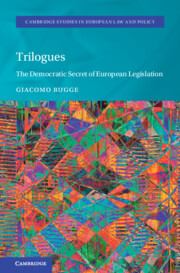
-
Select format
-
- Publisher:
- Cambridge University Press
- Publication date:
- January 2025
- January 2025
- ISBN:
- 9781009445238
- 9781009445207
- Dimensions:
- (229 x 152 mm)
- Weight & Pages:
- 0.51kg, 252 Pages
- Dimensions:
- Weight & Pages:
You may already have access via personal or institutional login
Book description
The events of the last ten years have shaken the “permissive consensus” that kept the European integration process going for many years. 'Output democracy', as based on decisions presumably meeting the needs of the citizens, is no longer enough to obtain public support. Never before has a process-oriented approach to European democracy been more urgent. This book aims to address this urgency, by providing an account of the European legislative process that is less conventional and does justice to the democratic potential inherent in trilogues. In particular, this book provides: a comprehensive reconstruction of the workings of trilogues, relying on internal documents collected through a series of access to documents requests; gives meaning to the legal notion of informality, understood as one of the most defining, although elusive, features of trilogues; squares the practice of trilogues with the European democratic order of the Treaties, showing that such a practice is compatible with a model of 'negotiation democracy'.
Contents
Metrics
Altmetric attention score
Full text views
Full text views help Loading metrics...
Loading metrics...
* Views captured on Cambridge Core between #date#. This data will be updated every 24 hours.
Usage data cannot currently be displayed.
Accessibility standard: Unknown
Why this information is here
This section outlines the accessibility features of this content - including support for screen readers, full keyboard navigation and high-contrast display options. This may not be relevant for you.
Accessibility Information
Accessibility compliance for the PDF of this book is currently unknown and may be updated in the future.

